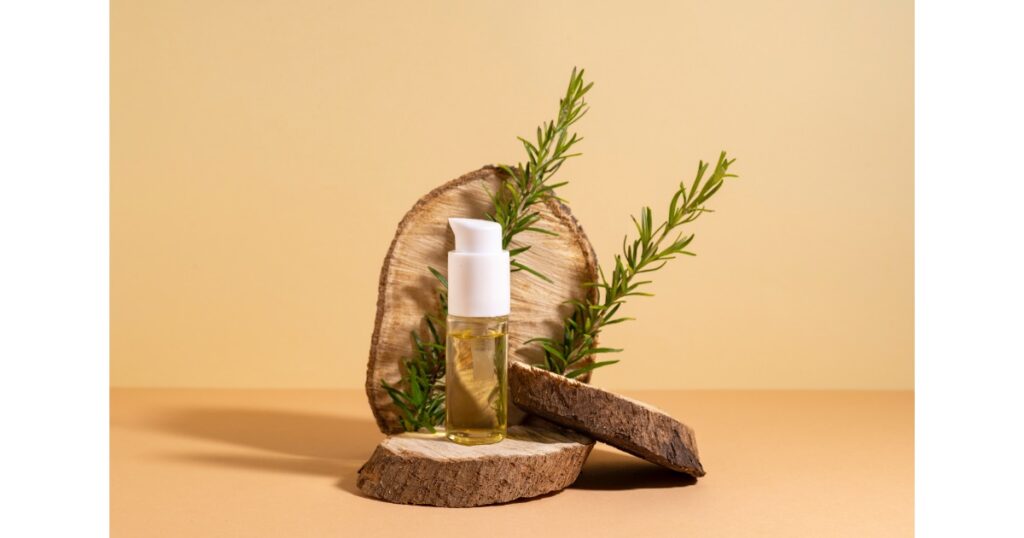Are you on a quest for the perfect hair care solution?
The magic potion that not only addresses our hair concerns but also fits seamlessly into daily routine?
If you’ve ever found yourself longing for healthier, more resilient locks, you’re not alone.
In this blog, we are putting the spotlight on Rosemary Essential Oil – a herbal powerhouse with an established reputation for promoting hair health. We will understand the science behind this essential oil, its key components, and how it can be a game-changer in your hair care routine.
Backed by scientific insights, Rosemary Essential Oil isn’t just a passing trend, it is a time-tested ally for those seeking natural solutions for their hair.
Get ready to explore the benefits of rosemary essential oil, delving into its revitalizing properties and the science behind its effectiveness.
Table of Contents
What is Rosemary Oil?
Rosemary oil is an essential oil derived from the leaves of the rosemary plant, scientifically known as Rosmarinus officinalis.
The extraction process typically involves steam distillation, where steam is passed through the fresh or dried leaves of the rosemary plant to capture and condense the aromatic compounds into a concentrated, volatile liquid – the essential oil.
Key characteristics of rosemary oil include its herbaceous, woody scent with hints of camphor.
This essential oil has been used for centuries for various purposes, ranging from culinary applications to traditional medicine and aromatherapy. Some of the primary components found in rosemary oil that contribute to its therapeutic properties include:
- Cineole (Eucalyptol): Known for its respiratory benefits and anti-inflammatory properties.
- Camphor: Exhibits antimicrobial and anti-inflammatory properties.
- Pinene: Contributes to the oil’s distinct pine-like aroma and may have anti-inflammatory effects.
- Camphene, Limonene, and Linalool: Additional compounds that add to the overall aromatic profile and potential health benefits.

Are Rosemary Oil and Rosemary Essential Oil The Same?
Yes, “Rosemary oil” and “Rosemary essential oil” generally refer to the same thing. Both terms are used interchangeably to describe the aromatic oil extracted from the leaves of the rosemary plant.
Rosemary Oil Benefits
These are some of the health benefits associated with rosemary oil.
Hair Growth and Scalp Health
Rosemary oil’s magical touch extends beyond mere fragrance, it is a natural elixir that stimulates hair growth and promotes scalp health.
Rosemary oil is renowned for its positive effects on hair growth and scalp health. Its ability to stimulate blood circulation in the scalp promotes hair follicle health and may contribute to hair growth1.
Additionally, the oil’s anti-inflammatory and antimicrobial properties can also help you maintain a healthy scalp, reducing dandruff and other scalp conditions.
Mental Clarity and Focus
In the hustle and bustle of modern life, maintaining mental clarity and focus can feel challenging.
Inhaling the scent may enhance mental clarity, concentration, and memory2. Diffusing rosemary oil in your workspace or incorporating it into aromatherapy practices can help create a more alert and focused mindset.
Whether it’s deadlines at work or study sessions, let rosemary oil be the secret weapon that helps you navigate the challenges with a clear and focused mind.
Skin Health and Acne Control
Tackling acne and inflammation? It is a natural solution that understands the struggles of blemishes and breakouts.
Rosemary oil can be your reliable companion in the journey to clear, radiant skin and overall skin vitality.
Rosemary essential oil possesses antimicrobial and anti-inflammatory properties, making it beneficial for skin health3.
When diluted appropriately, it can be applied topically to help address acne, reduce inflammation, and promote a clearer complexion.
Pain Relief and Muscle Relaxation
Used in massage or diluted in a carrier oil, rosemary oil may provide relief from muscle aches and pains.
Its analgesic properties may help alleviate discomfort, making it a popular choice for massage blends aimed at promoting relaxation and easing sore muscles.
Respiratory Support
Whether it is seasonal challenges or the common cold, try rosemary essential oil can be a valuable addition to aromatherapy during cold and flu seasons.
Cineole, a key component in rosemary oil, has been associated with respiratory benefits. Inhaling the vapor of rosemary oil may help open airways, making it beneficial for individuals experiencing respiratory congestion or discomfort.
Antioxidant Protection
Rosemary essential oil contains antioxidants and compounds like carnosic acid, carnosol and rosmarinic acid, that help combat free radicals, which can contribute to cellular damage and ageing.
By neutralizing free radicals, rosemary oil may contribute to skin health and overall well-being, providing a natural defense against oxidative stress.
Stress Reduction and Relaxation
Stress is an unwelcome companion in our daily lives, affecting our well-being on multiple levels.
The soothing aroma of rosemary oil has relaxing properties that can help alleviate stress and tension4.
Incorporating this essential oil into your relaxation routine, such as through diffusing or adding it to a warm bath, can contribute to a calming atmosphere.

Rosemary Oil Benefits for Hair
Rosemary oil has been shown to offer a holistic approach to hair care.
Its potent ability to stimulate blood circulation in the scalp not only fosters a nutrient-rich environment for hair follicles but also promotes hair growth.
Beyond growth, rosemary oil’s anti-inflammatory and antimicrobial properties addresses common scalp issues, making it a natural remedy for dandruff and itching. Imagine the relief of a nourished scalp, free from discomfort.
Whether your hair is longing for a rejuvenating boost or you are battling scalp concerns, try incorporating rosemary oil into your hair care ritual.
Say goodbye to the frustration of slow-growing strands and welcome voluminous and resilient hair with rosemary essential oil.
How to Use Rosemary Oil for Hair Growth?
For hair growth, you can incorporate rosemary oil into your hair care routine through various methods.
Here’s a step-by-step guide on how to use rosemary oil for promoting hair growth:
Choose a High-Quality Rosemary Essential Oil
Select a pure and high-quality rosemary essential oil. Ensure that it is 100% pure and free from additives or synthetic ingredients.
Dilution with a Carrier Oil
Rosemary essential oil is potent, so it is important to dilute it before applying it to your scalp. Mix a few drops of rosemary oil with a carrier oil such as jojoba, coconut, or almond oil.
Scalp Massage
Gently massage the diluted rosemary oil onto your scalp using your fingertips. The massage helps improve blood circulation to the hair follicles, promote nutrient delivery and encourage hair growth.
Leave-In Treatment
Leave the diluted rosemary oil on your scalp for at least 30 minutes to an hour. For a more intensive treatment, you can leave it on overnight by applying it before bedtime.
DIY Rosemary Oil Hair Rinse
Add a few drops of rosemary oil to a cup of water and use it as a final hair rinse after shampooing. This can provide a refreshing and invigorating boost to your scalp.
Regular Use
Consistency is key. For noticeable results, use rosemary oil for hair growth regularly.
Consider a Scalp Massage Brush
Using a scalp massage brush along with the rosemary oil application can enhance the massage effect, promoting better absorption and circulation.

Does Rosemary Oil Regrow Hair?
Rosemary essential oil is often touted for its potential to stimulate hair growth.
- Stimulation of Hair Follicles: Rosemary oil has been studied for its ability to improve blood circulation to the scalp, which can enhance nutrient delivery to hair follicles. This may contribute to a healthier environment for hair growth.
- DHT Inhibition: Some studies suggest that rosemary oil may inhibit the production of dihydrotestosterone (DHT), a hormone associated with hair loss. By reducing DHT levels, rosemary oil may indirectly support hair growth.
- Improvement in Scalp Health: The antimicrobial and anti-inflammatory properties of rosemary oil can contribute to a healthier scalp, reducing conditions like dandruff and itching. A healthy scalp is essential for promoting optimal hair growth.
- Individual Variability: The response to any hair treatment, including rosemary oil, can vary among individuals. Factors such as genetics, overall health, and the specific cause of hair loss play a role in determining the effectiveness of any remedy.
Summary
In conclusion, the use of rosemary essential oil for hair care has garnered significant attention, and its potential benefits are backed by both traditional and emerging scientific research.
From promoting hair growth and thickness to addressing issues like dandruff and scalp irritation, rosemary essential oil may offer positive effects for maintaining healthy and vibrant hair.
However, it is essential to conduct a patch test before using rosemary essential oil to ensure compatibility with your skin.
Consulting with a trichologist or a dermatologist can provide personalized advice, especially for those with pre-existing conditions or allergies.
Frequently Asked Questions
Is rosemary oil safe for use on the skin?
Yes, when properly diluted with a carrier oil, rosemary oil is generally safe for topical use.
How can I use rosemary oil for hair growth?
Dilute a few drops in a carrier oil and massage into the scalp. Leave it on for at least 30 minutes before washing.
What are the potential side effects of using rosemary oil?
Some individuals may experience skin irritation. Always dilute and perform a patch test.
Does rosemary oil help with dandruff and itchy scalp?
Yes, rosemary oil’s antimicrobial properties can help reduce dandruff and soothe an itchy scalp.
Can rosemary oil be ingested or used in cooking?
Culinary-grade rosemary oil can be used sparingly in cooking. However, for therapeutic purposes, it is generally not recommended for ingestion.
What is the best way to dilute rosemary oil for topical application?
A common dilution ratio is 2-3 drops of rosemary oil per teaspoon of carrier oil.
Are there any precautions or contraindications during pregnancy?
Pregnant individuals should consult with a healthcare professional before using rosemary oil due to potential risks.
What are the benefits of using rosemary oil in aromatherapy?
Aromatherapy with rosemary oil may improve mental clarity, focus, and provide a sense of relaxation.
Can rosemary oil be used for treating acne and improving skin complexion?
Yes, its antimicrobial and anti-inflammatory properties can help with acne. Always dilute before applying to the skin.
What are some DIY recipes for skincare or haircare using rosemary oil?
Recipes include hair masks, face serums, and scalp treatments. Mix with carrier oils and other essential oils as desired.
Can rosemary oil be used for relieving headaches or migraines?
Yes, inhaling the aroma or using it in a massage blend may provide relief.
How long does it take to see results for hair growth?
Results vary, but consistent use over several weeks is often recommended for noticeable effects.
What is the recommended age for using rosemary oil on children’s hair?
Children under two should avoid essential oils.
Can rosemary oil be mixed with other essential oils for a synergistic effect?
Yes, it can be blended with oils like lavender, cedarwood, or peppermint for a complementary effect.
What is the difference between rosemary oil and rosemary extract?
Rosemary oil is the concentrated aromatic liquid, while rosemary extract is often a diluted form used in cooking and skincare.
Are there any alternatives to rosemary oil for similar benefits?
Lavender, peppermint, and cedarwood oils are often considered alternatives for certain purposes, but each has its unique properties.
Sources
- Uronnachi, E., Atuegwu, C., Umeyor, C., Nwakile, C., Obasi, J., Ikeotuonye, C., & Attama, A. A. (2022). Formulation and evaluation of hair growth enhancing effects of oleogels made from Rosemary and Cedar wood oils. Scientific African, 16, e01223. https://doi.org/10.1016/j.sciaf.2022.e01223 ↩︎
- Rahbardar, M. G., & Hosseinzadeh, H. (2020). Therapeutic effects of rosemary (Rosmarinus officinalis L.) and its active constituents on nervous system disorders. PubMed, 23(9), 1100–1112. https://doi.org/10.22038/ijbms.2020.45269.10541 ↩︎
- Nieto, G., Ros, G., & Castillo, J. (2018). Antioxidant and Antimicrobial Properties of Rosemary (Rosmarinus officinalis, L.): A Review. Medicines, 5(3), 98. https://doi.org/10.3390/medicines5030098 ↩︎
- Araki, R., Sasaki, K., Onda, H., Nakamura, S., Kassai, M., Kobayashi, T., Isoda, H., & Hashimoto, K. (2020). Effects of continuous intake of rosemary extracts on mental health in working generation healthy Japanese men: Post-Hoc testing of a randomized controlled trial. Nutrients, 12(11), 3551. https://doi.org/10.3390/nu12113551 ↩︎
